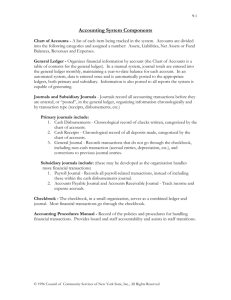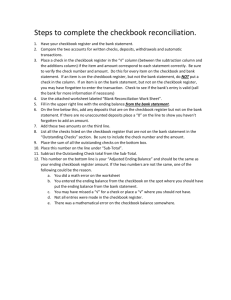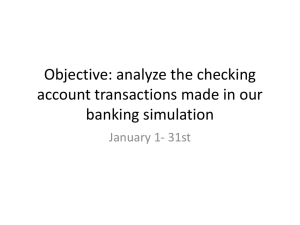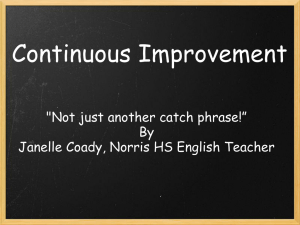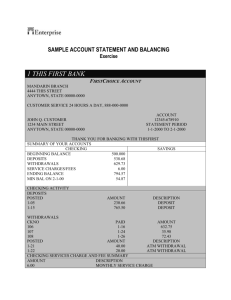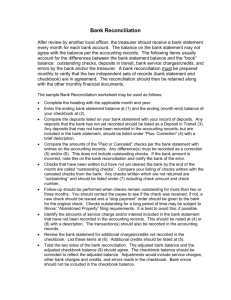Form 005 Bank Recon. Worksheet & Instructions
advertisement
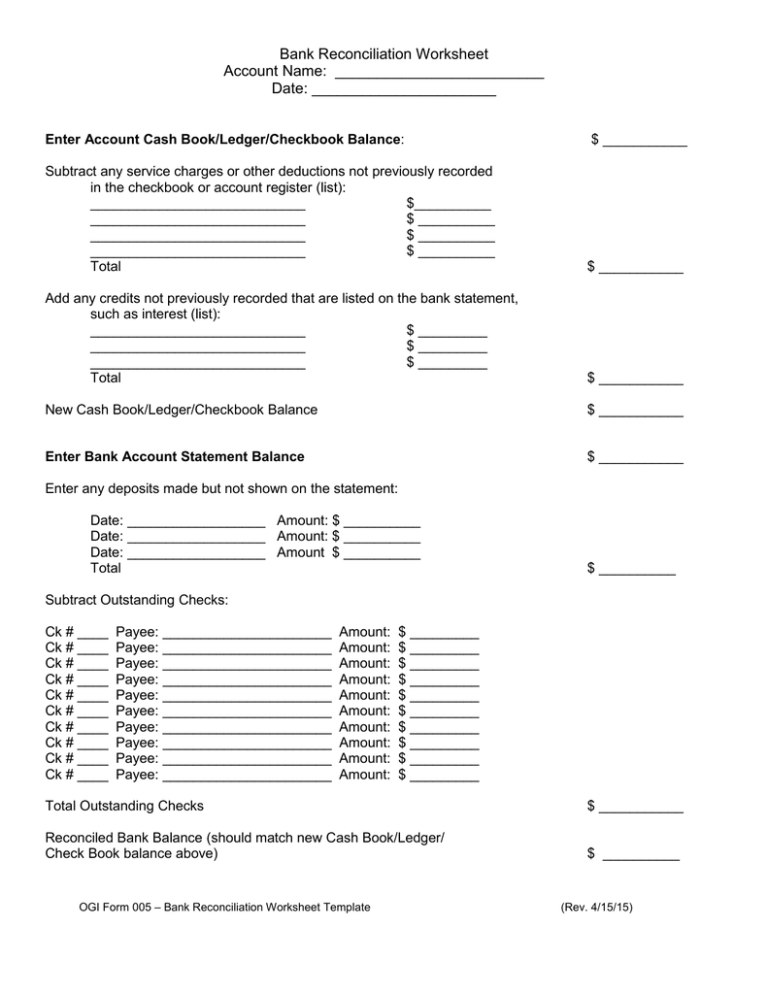
Bank Reconciliation Worksheet Account Name: _________________________ Date: ______________________ Enter Account Cash Book/Ledger/Checkbook Balance: $ ___________ Subtract any service charges or other deductions not previously recorded in the checkbook or account register (list): ____________________________ $__________ ____________________________ $ __________ ____________________________ $ __________ ____________________________ $ __________ Total $ ___________ Add any credits not previously recorded that are listed on the bank statement, such as interest (list): ____________________________ $ _________ ____________________________ $ _________ ____________________________ $ _________ Total $ ___________ New Cash Book/Ledger/Checkbook Balance $ ___________ Enter Bank Account Statement Balance $ ___________ Enter any deposits made but not shown on the statement: Date: __________________ Amount: $ __________ Date: __________________ Amount: $ __________ Date: __________________ Amount $ __________ Total $ __________ Subtract Outstanding Checks: Ck # ____ Ck # ____ Ck # ____ Ck # ____ Ck # ____ Ck # ____ Ck # ____ Ck # ____ Ck # ____ Ck # ____ Payee: ______________________ Payee: ______________________ Payee: ______________________ Payee: ______________________ Payee: ______________________ Payee: ______________________ Payee: ______________________ Payee: ______________________ Payee: ______________________ Payee: ______________________ Amount: Amount: Amount: Amount: Amount: Amount: Amount: Amount: Amount: Amount: $ _________ $ _________ $ _________ $ _________ $ _________ $ _________ $ _________ $ _________ $ _________ $ _________ Total Outstanding Checks $ ___________ Reconciled Bank Balance (should match new Cash Book/Ledger/ Check Book balance above) $ __________ OGI Form 005 – Bank Reconciliation Worksheet Template (Rev. 4/15/15) OGI Form 005 – Bank Reconciliation Worksheet - Instructions 1. The Bank Reconciliation (checkbook balancing) is used to resolve differences, if any, between the Treasurer’s financial records (Cash Book/Ledger/Checkbook) and the bank statement balance at a given point in time. It is a Microsoft Word file that can be completed electronically or can be copied and completed manually. 2. Differences between the bank balance and the Lodge’s/Treasurer’s records may occur as a result of the following: a. Outstanding checks – checks written but not cleared (not submitted and paid by the bank) b. Deposits in transit – money deposited into the account but not yet shown on the bank statement c. Bank fees/charges against the account d. Bank interest earned and credited to the account e. Other bank transactions that may increase or decrease the bank account balance 3. The Treasurer should reconcile the bank statements at least monthly but may do so more often. For example, if the Treasurer has online access to the account, he can reconcile his records against the bank balance on the same day, using the latest information available on the bank statement or transactions list. 4. The Process: a. Have the Cash Book or ledger and the Checkbook available. Obtain the bank statement, or pull an online statement or transactions list for the bank account. (Recommendation: Review the bank statement for any bank transactions not already recorded in the Treasurer’s records and record them in the Cash Book/ledger/checkbook on the dates indicated in the statement. If this is not done, an adjustment may need to be made at the end to balance. See Step 12.) b. Obtain a blank bank reconciliation worksheet and enter the account name and date on the worksheet. c. Enter the Treasurer’s “Cash Book/Ledger/Checkbook Balance” on the first line. Note that the Cash Book or ledger balance should be the same as the checkbook balance. d. List in the next section any service charges or other deductions not previously recorded in the Cash Book/ledger and/or checkbook. These will be subtracted from the Cash Book/Ledger/Checkbook balance on the worksheet. e. List in the following section any credits not previously recorded in the Treasurer’s Cash Book/ledger and checkbook that are listed on the bank statement. These will be added to the Cash Book/ledger/checkbook balance on the worksheet. f. After subtracting the items in Step 4 and adding the items in Step 5, the “New Cash Book/Ledger/Checkbook Balance” will be the result. g. Now, enter the bank statement ending balance on the “Bank Account Statement Balance” line. h. Next, list/add any deposits made during the month that are not shown on the bank statement. i. In the next section, list and subtract any outstanding checks (checks that are not listed/”cleared” on the bank statement. j. After adding the deposits not on the bank statement and subtracting the outstanding checks, the result will be the reconciled bank account balance. k. The reconciled bank statement balance computed in Step 10 should agree with the ending checkbook balance computed in Step 6. If not, check for errors. Errors may occur if previous outstanding checks were not considered. The Treasurer may have to go back several months to locate checks not previously identified as being outstanding to reconcile. OGI Form 005 – Bank Reconciliation Worksheet Template (Rev. 4/15/15) l. If there is a difference between the “Cash Book/Ledger/Checkbook Balance,” in Step 3, and the “New Cash Book/Ledger/Checkbook Balance,” in Step 6, the Treasurer will need to make an adjustment in the amount of that difference to “balance” his Cash Book/ledger/checkbook to the bank statement balance. 5. The Treasurer should maintain bank account reconciliations with the bank statements reconciled and make them available to the audit committee or the Grand Inspector’s staff, upon request. in accordance with Article XXXIII, Section 7, of the Constitution of the MWPHGL of MD, Inc., and Its Jurisdiction and the bylaws of the Lodge. OGI Form 005 – Bank Reconciliation Worksheet Template (Rev. 4/15/15)
